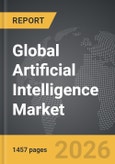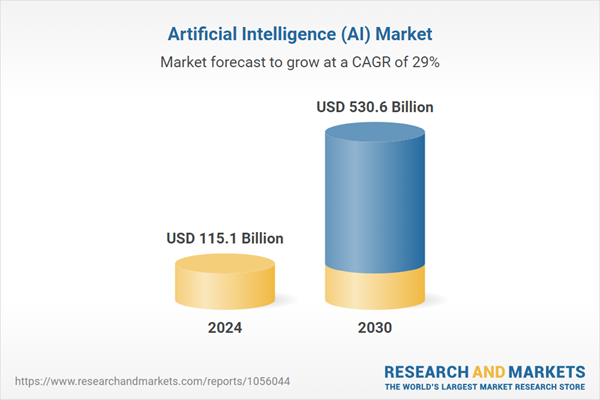Global Artificial Intelligence (AI) Market - Key Trends and Drivers Summarized
What Is Driving the Rise of Artificial Intelligence in Today's World?
Artificial intelligence (AI) has emerged as one of the most transformative technologies of the 21st century, revolutionizing industries and reshaping how businesses and societies operate. From automating repetitive tasks to enabling predictive analytics, AI's capabilities span a vast array of applications. Its adoption is being driven by exponential growth in computational power, the availability of big data, and advancements in machine learning algorithms. Sectors such as healthcare, finance, and manufacturing are leveraging AI for enhanced decision-making, operational efficiency, and improved customer experiences. For example, AI-driven diagnostic tools are improving early disease detection in healthcare, while in finance, algorithms analyze vast datasets to detect fraudulent activities in real-time. As the technology matures, AI is transitioning from a novel innovation to a foundational element of business and societal infrastructure, fostering unprecedented levels of efficiency and innovation.How Are AI Technologies Evolving to Meet Complex Challenges?
The rapid evolution of AI technologies is enabling solutions to increasingly complex challenges. Deep learning, a subset of machine learning, is leading this evolution by mimicking the neural networks of the human brain to process unstructured data such as images, text, and audio. Natural language processing (NLP) has seen significant advancements, making conversational AI applications like chatbots and virtual assistants more intuitive and effective. Additionally, AI models like generative adversarial networks (GANs) are creating synthetic content with remarkable realism, which has applications in fields such as entertainment, design, and cybersecurity. Edge AI, which processes data locally rather than in the cloud, is gaining traction in applications requiring real-time responses, such as autonomous vehicles and industrial robotics. These technological advancements not only extend AI's capabilities but also make it more accessible across industries, setting the stage for its widespread integration into daily life.What Trends and Applications Are Shaping the Future of AI?
Artificial intelligence is at the forefront of several transformative trends, redefining how industries operate and innovate. The integration of AI with the Internet of Things (IoT) has led to the rise of smart ecosystems, where devices communicate and learn from each other to optimize performance in homes, factories, and cities. AI is also driving advancements in personalized marketing by analyzing consumer behavior to deliver tailored experiences, which is reshaping the retail and advertising landscapes. Ethical AI has emerged as a crucial focus, with organizations prioritizing transparency and bias mitigation to ensure equitable outcomes. In education, AI is being used to create adaptive learning platforms, while in environmental science, it assists with climate modeling and resource optimization. Another key trend is the democratization of AI, as cloud-based services and open-source frameworks lower the barriers to entry, enabling smaller businesses and startups to harness its potential. These trends demonstrate AI's far-reaching implications across diverse domains.What Drives the Growth in the AI Market?
The growth in the AI market is driven by several factors, including technological advancements, increasing end-use applications, and changing consumer and industry expectations. The proliferation of data from digital devices and connected systems has provided the fuel for AI algorithms to generate actionable insights. Rising adoption of AI-powered automation in sectors like manufacturing and logistics has streamlined operations and reduced costs, boosting demand for intelligent systems. The growing emphasis on enhancing customer experiences has encouraged industries like retail and healthcare to adopt AI for personalized solutions. Furthermore, advancements in cloud computing have facilitated the deployment of AI models at scale, enabling businesses to integrate intelligent capabilities without heavy infrastructure investments. The increasing focus on sustainability has also contributed, with AI being deployed to optimize energy consumption and reduce carbon footprints. These drivers collectively underscore the expanding scope and influence of AI across global markets, ensuring its pivotal role in shaping the future of technology and society.Report Scope
The report analyzes the Artificial Intelligence (AI) market, presented in terms of market value (USD). The analysis covers the key segments and geographic regions outlined below.- Segments: Component (Software Component, Hardware Component, Services Component); Technology (Machine Learning Technology, Natural Language Processing Technology, Computer Vision Technology, Context-aware Technology); End-Use (Advertising & Media End-Use, BFSI End-Use, Healthcare End-Use, Retail End-Use, Automotive & Transportation End-Use, Manufacturing End-Use, Agriculture End-Use, Other End-Uses).
- Geographic Regions/Countries: World; USA; Canada; Japan; China; Europe; France; Germany; Italy; UK; Spain; Russia; Rest of Europe; Asia-Pacific; India; South Korea; Rest of Asia-Pacific; Rest of World.
Key Insights:
- Market Growth: Understand the significant growth trajectory of the AI Software segment, which is expected to reach US$222.8 Billion by 2030 with a CAGR of 29.7%. The AI Hardware segment is also set to grow at 24.1% CAGR over the analysis period.
- Regional Analysis: Gain insights into the U.S. market, valued at $39.4 Billion in 2024, and China, forecasted to grow at an impressive 33.5% CAGR to reach $110.6 Billion by 2030. Discover growth trends in other key regions, including Japan, Canada, Germany, and the Asia-Pacific.
Why You Should Buy This Report:
- Detailed Market Analysis: Access a thorough analysis of the Global Artificial Intelligence (AI) Market, covering all major geographic regions and market segments.
- Competitive Insights: Get an overview of the competitive landscape, including the market presence of major players across different geographies.
- Future Trends and Drivers: Understand the key trends and drivers shaping the future of the Global Artificial Intelligence (AI) Market.
- Actionable Insights: Benefit from actionable insights that can help you identify new revenue opportunities and make strategic business decisions.
Key Questions Answered:
- How is the Global Artificial Intelligence (AI) Market expected to evolve by 2030?
- What are the main drivers and restraints affecting the market?
- Which market segments will grow the most over the forecast period?
- How will market shares for different regions and segments change by 2030?
- Who are the leading players in the market, and what are their prospects?
Report Features:
- Comprehensive Market Data: Independent analysis of annual sales and market forecasts in US$ Million from 2024 to 2030.
- In-Depth Regional Analysis: Detailed insights into key markets, including the U.S., China, Japan, Canada, Europe, Asia-Pacific, Latin America, Middle East, and Africa.
- Company Profiles: Coverage of players such as Advanced Micro Devices, Inc., AIBrain, Inc., Amazon Web Services, Inc., Baidu AI Cloud, Cisco Systems, Inc. and more.
- Complimentary Updates: Receive free report updates for one year to keep you informed of the latest market developments.
Some of the 515 companies featured in this Artificial Intelligence (AI) market report include:
- Advanced Micro Devices, Inc.
- AIBrain, Inc.
- Amazon Web Services, Inc.
- Baidu AI Cloud
- Cisco Systems, Inc.
- eGain Corporation
- General Electric Company
- Google, Inc.
- Intel Corporation
- International Business Machines Corporation (IBM)
- Meta
- Micron Technology, Inc.
- Microsoft Corporation
- NTT Corporation
- NVIDIA Corporation
- Omron Corporation
- Oracle Corporation
- Orange Polska SA
- Rockwell Automation, Inc.
- Salesforce.com, Inc.
- Samsung Electronics Co., Ltd.
- SAP SE
- SAS Institute Inc.
- Siemens AG
This edition integrates the latest global trade and economic shifts into comprehensive market analysis. Key updates include:
- Tariff and Trade Impact: Insights into global tariff negotiations across 180+ countries, with analysis of supply chain turbulence, sourcing disruptions, and geographic realignment. Special focus on 2025 as a pivotal year for trade tensions, including updated perspectives on the Trump-era tariffs.
- Adjusted Forecasts and Analytics: Revised global and regional market forecasts through 2030, incorporating tariff effects, economic uncertainty, and structural changes in globalization. Includes historical analysis from 2015 to 2023.
- Strategic Market Dynamics: Evaluation of revised market prospects, regional outlooks, and key economic indicators such as population and urbanization trends.
- Innovation & Technology Trends: Latest developments in product and process innovation, emerging technologies, and key industry drivers shaping the competitive landscape.
- Competitive Intelligence: Updated global market share estimates for 2025, competitive positioning of major players (Strong/Active/Niche/Trivial), and refined focus on leading global brands and core players.
- Expert Insight & Commentary: Strategic analysis from economists, trade experts, and domain specialists to contextualize market shifts and identify emerging opportunities.
Table of Contents
Companies Mentioned (Partial List)
A selection of companies mentioned in this report includes, but is not limited to:
- Advanced Micro Devices, Inc.
- AIBrain, Inc.
- Amazon Web Services, Inc.
- Baidu AI Cloud
- Cisco Systems, Inc.
- eGain Corporation
- General Electric Company
- Google, Inc.
- Intel Corporation
- International Business Machines Corporation (IBM)
- Meta
- Micron Technology, Inc.
- Microsoft Corporation
- NTT Corporation
- NVIDIA Corporation
- Omron Corporation
- Oracle Corporation
- Orange Polska SA
- Rockwell Automation, Inc.
- Salesforce.com, Inc.
- Samsung Electronics Co., Ltd.
- SAP SE
- SAS Institute Inc.
- Siemens AG
Table Information
| Report Attribute | Details |
|---|---|
| No. of Pages | 1457 |
| Published | January 2026 |
| Forecast Period | 2024 - 2030 |
| Estimated Market Value ( USD | $ 115.1 Billion |
| Forecasted Market Value ( USD | $ 530.6 Billion |
| Compound Annual Growth Rate | 29.0% |
| Regions Covered | Global |









